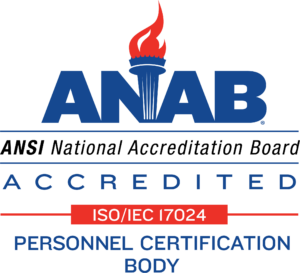
Master Safety Professional (MSP)®
An MSP is an individual with high-level specialist and strategic skills. They are likely to be involved in the development and implementation of a comprehensive facility-wide or corporate safety and health program and are influential with senior management and policymakers. Their perspective embraces the broader organizational and social context.

Certified Safety Director (CSD)®
A CSD is involved in problem solving and application of strategy; their advice is based on conceptual and technical knowledge mediated by training and experience, analysis of evidence, and critical thought. They understand how to use and access the evidence base and value professional collaboration. They are capable of working with minimal supervision and usually give direction to others.
Certifications
Certification Prep Courses
Accreditation and Recognition

The Master Safety Professional (MSP)® and Certified Safety Director (CSD)® credentials are accredited by the ANSI National Accreditation Board (ANAB). These certifications are accredited under the ISO/IEC 17024:2012 standard for personnel certification programs
Increase your earning Potential
$0
$0
$0
Professional certifications can lead to higher salaries. Companies value certified individuals for their expertise, as shown in the 2020 EHS Salary Survey: professionals without certifications earn an average of $84,200 annually, those with one certification earn $96,260, and those with two or more certifications average $109,360, demonstrating the financial advantages of certification.
Road Map to Certification
1
Choose Certification
Decide on which certification best fits your career goals.
2
Determine Eligibility
Check out our eligibility tracks to ensure that you qualify.
3
Submit Application
If eligible, submit your application to the NASP Certification Board.
4
Prepare for Exam
Study for the exam using the examination blueprint or optional preparation courses.
5
Take the Exam
Sit for the three-hour, closed book, proctored examination.
6
Get Your Certification
Upon passing, earn your CSD or MSP certification and maintain certification by completing qualifying Continuing Education Units (CEUs) and/or Academic Credits.
Frequently asked questions
NASPCB FAQ
The NASP/IASP, Inc. Certification Board (NASPCB) is a separately functioning entity established to oversee the NASP/IASP, Inc. Certification Program and to separate the roles and responsibilities between the NASP/IASP, Inc. Board of Directors and the NASP/IASP, Inc. Certification Program to maintain impartiality and neutrality. The Certification Board operates independently to establish and uphold high standards of competence for workplace safety professionals, to evaluate professionals against those standards, and to increase safety in the workplace through the CSD and MSP credentials.
With strategic oversight from the Executive Board, the NASP/IASP, Inc. Certification Board was established to set the standards and qualifications for individuals who practice specific disciplines within the workplace safety profession; to establish voluntary certification testing of applicants who meet or exceed the training, educational, and professional experience requirements set by the Certification Board; to annually review, and if necessary, revise the standards and qualifications, as well as the Board's provisions in the NASP/IASP, Inc. Certification Program Operations Manual and NASP/IASP, Inc. Certification Program Candidate Handbook.
The CSD and ASP certifications share a few similarities; both certifications:
- Are accredited by the ANSI National Accreditation Board (ANAB) under the ISO/IEC 17024:2012 standard General requirements for bodies operating certification of persons
- Have a thorough application process
- Have predetermined educational and experiential requirements
- Consist of sit-down examinations proctored by a third-party
- Require recertification to maintain certification
The CSD separates itself from the ASP in the following ways:
Qualified Credential: The CSD requires a qualified credential listed within the CSD Eligibility Track. Click here to view the CSD Eligibility Track.
Education: NASP recognizes that some workplace safety professionals may not have obtained the higher education or math and engineering skills required or are in the process of doing so, which restricts them from earning certain credentials such as the ASP (or other well-known certifications.) Yet their years of experience, vast knowledge in the industry, and hands-on practical approach to workplace safety left a clear opportunity for NASP to develop the CSD to validate and acknowledge these individuals. Click here to see the CSD eligibility track to see if you qualify.
Body of Knowledge: While both exams cover similar bodies of knowledge, the CSD prides itself on being the practicing safety professional's certification. What does this mean exactly? The CSD exam focuses on practical workplace safety knowledge that you, as a professional, use daily to keep your employees safe. The CSD exam focuses less on science and mathematics and more on the laws and consensus standards that you, as a safety professional, work with every day. 39.28% of the exam blueprint covers Laws and Standards. Only 3.71% of the exam blueprint covers Science and Mathematics. Click here to review the CSD examination blueprint.
Examination:
- The ASP is a 5-hour exam and consists of 200 questions.
- The CSD is a 3-hour exam and consists of 150 questions.
Cost:
- The ASP is $160 (application fee) + $350 (examination fee). The ASP does not require a recertification fee; however, the ASP requires a $170 annual renewal fee.
- The CSD is $75 (application fee) + $395 (examination fee includes one retake exam). The CSD requires a $195 recertification fee. This fee is not due until the end of the 3-year cycle.
Click here to see the full CSD fee structure.
Recertification:
- The ASP requires Certificants to obtain 25 recertification points per 5-year cycle. These points can be earned through 10 activity categories. BCSP measures all acceptable activities in terms of recertification points. Certain activities state maximum points allowed amount per cycle or per year, while there are no limits to other activities. The ASP does not require a recertification fee; however, the ASP requires a $180 annual renewal fee.
- The CSD requires Certificants to complete *4.8 CEUs/Semester Hours over a 3-year certification cycle (1.6 CEUs/Semester Hours per year), which equals 48 hours of contact time (16 hours per year). The MSP requires a $195 recertification fee due at the end of the 3-year cycle. To view the CSD recertification requirements, click here.
*Continuing Education Units (CEUs) One (1) CEU, which is the equivalent to ten (10) hours of instruction, equals one (1) recertification point.
*Academic Credits (Semester Hours) 1 Semester Hour will be equivalent to 1 CEU
The MSP and CSP certifications share a few similarities; both certifications:
- Are accredited by the ANSI National Accreditation Board (ANAB) under the ISO/IEC 17024:2012 standard General requirements for bodies operating certification of persons
- Have a thorough application process
- Require previously-obtained qualified credentials
- Have predetermined educational and experiential requirements
- Consist of sit-down examinations proctored by a third-party
- Require recertification to maintain certification
The MSP separates itself from the CSP in the following ways:
Education: NASP recognizes that some workplace safety professionals may not have obtained the higher education or math and engineering skills required, or are in the process of doing so, which restricts them from earning certain credentials such as the CSP (or other well-known certifications.) Yet their years of experience, vast knowledge in the industry, and hands-on practical approach to workplace safety left a clear opportunity for NASP to develop the MSP to validate and acknowledge these individuals. Click here to see the MSP’s eligibility track to see if you qualify.
Body of Knowledge: While both exams cover similar bodies of knowledge, the MSP prides itself on being the practicing safety professional’s certification. What does this mean exactly? The MSP exam focuses on practical workplace safety knowledge that you, as a professional, use daily to keep your employees safe. The MSP exam focuses less on science, mathematics, and engineering and more on the laws and consensus standards that you, as a safety professional, work with every day. 42.44% of the exam blueprint covers Laws and Standards. Only 4.10% of the exam blueprint covers Science and Mathematics. Click here to review the MSP examination blueprint.
Examination:
- The CSP is a 5.5-hour exam and consists of 200 questions.
- The MSP is a 3-hour exam and consists of 150 questions.
Cost:
- The CSP is $160 (application fee) + $350 (examination fee). The CSP does not require a recertification fee; however, the CSP requires a $180 annual renewal fee.
- The MSP is $75 (application fee) + $450 (examination fee includes one retake exam). The MSP requires a $250 recertification fee. This fee is not due until the end of the 3-year cycle.
Click here to see the full MSP fee structure.
Recertification:
- The CSP requires Certificants to obtain 25 recertification points per 5-year cycle. These points can be earned through 10 activity categories. BCSP measures all acceptable activities in terms of recertification points. Certain activities state maximum points allowed amount per cycle or per year, while there are no limits to other activities. The CSP does not require a recertification fee; however, the CSP requires a $180 annual renewal fee.
- The MSP requires Certificants to complete *4.8 CEUs/Semester Hours over a 3-year certification cycle (1.6 CEUs/Semester Hours per year), which equals 48 hours of contact time (16 hours per year). The MSP requires a $250 recertification fee due at the end of the 3-year cycle. To view the MSP recertification requirements, click here.
*Continuing Education Units (CEUs) One (1) CEU, which is the equivalent to ten (10) hours of instruction, equals one (1) recertification point.
*Academic Credits (Semester Hours) 1 Semester Hour will be equivalent to 1 CEUCandidates taking the MSP examination must meet one of the required tracks of eligibility.
Candidates taking the CSD examination must meet one of the required tracks of eligibility.
NASP/IASP, Inc. offers and accepts certificate courses as prerequisites to be eligible to take the CSD or MSP examination. All the courses listed are natural progressive steps in the education and training of workplace safety professionals and are not a requirement.
VA Benefits
The CSD and MSP exams are eligible for GI Bill® reimbursement. The Department of Veterans Affairs (VA) cannot issue reimbursement for other fees connected with obtaining a license or certification. Payment is issued after you submit proof of payment, etc., to the VA. Please note NASP does not determine or guarantee an individual’s eligibility for reimbursement.
“GI Bill®” is a registered trademark of the U.S. Department of Veterans Affairs (VA).
Click here for more information.
DOD COOL Program
The Department of Defense (DOD) Credentialing Opportunities On-Line (COOL) program recognizes the CSD and MSP credentials. The DOD Branch-Specific COOL Sites and DOD Civilian COOL contain resources and information on credentialing and available funding resources and/or credentialing assistance. Each Service has separate policies regarding what it pays for (Credential Preparation, Initial Credential Attainment, Credential Maintenance and Renewal).
Click here for more information.
For A Complete Guide to Certification, click here.
- Approved Eligibility
- Additional Information Required
- Denied Eligibility
- Kryterion Onsite Testing
- Online Proctoring (OLP) through Kryterion
- The score report will be visible to the candidate on the screen upon completion of the exam.
- An email will be sent from Kryterion upon exam completion to the candidate's email on file. The email includes the score report and performance in each category of the examination. An individual should contact the NASPCB Certification Personnel directly at 800-922-2219 if an email is not received.
- Candidate exam results are available to the Certification Board for review.
- Results of the candidate's score are uploaded to the NASP Student Portal Account.
- The NASPCB sends an email communication to the candidate with information on the results of the pass-fail result.
Documentation of CEUs/Semester Hours for non-NASP/IASP, Inc. courses or conferences must be uploaded to the Certificant’s NASP Student Portal account on or before the Certification expiration date as indicated on the Certificant’s Certification and NASP Student Portal account.
Click here for instructions on how to upload external training for recertification.
Please Note: Any NASP course purchased and completed within the recertification cycle will automatically upload and record the CEUs on the Certificant's NASP Student Portal Account.
- If a Certificant’s application is selected for an audit or is within the 180-day grace period for recertification, the Certification Personnel will contact the issuer and verify external CEUs/Semester Hours submitted for recertification using the Certificant's name, course title, certificate number, and issuer information.












